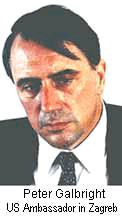
Intelligence and Counterintelligence |
Bosnia and Herzegovina


Mail & Guardian (gopher) SA's leading investigative newspaper News and Archives |
Arms smuggling from South Africa to Croatia during the war |
South Africa' s arms dealing underworld
(1995-6-2) Revealed where South Africa can sell arms (1995-7-28) |
|
on the former Yugoslavia Stockholm International Peace Research Institute
On 5 July 1991 the European Community and its Member States decided to impose an arms embargo on the former Yugoslavia.
|
|
Here (below) are the shortcuts to Mario's choice of The Federation of American Scientists World Wide Web documents. The Federation of American Scientists is engaged in analysis and advocacy on science, technology and public policy for global security. A privately-funded non-profit policy organization whose Board of Sponsors includes over 55 American Nobel Laureates, FAS was founded as the Federation of Atomic Scientists in 1945 by members of the Manhattan Project who produced the first atomic bomb. The Federation of American Scientists World Wide Web homepage, "The Best U.S. Intelligence Web Site" (Maintained by John Pike) hosts its various projects. For nearly fifteen years the FAS Space Policy Project has been a leading source of information and commentary on the intelligence community, with particular emphasis on intelligence agency budgets and satellite collection systems. Since 1991, the FAS Project on Government Secrecy has been working to illuminate the extent of government secrecy, challenging the political abuse of national security classification authority and other tools of the intelligence trade throughout the executive branch and identifying remedial measures. It also has links to various Washington-based working groups. |
|
Select Committee on Intelligence January 4, 1995 to October 3, 1996
The Committee's staff reviewed substantial material
provided by the CIA and the NSA and smaller, but significant,
amounts of material provided by the Department of State and
Department of Defense (including finished intelligence products
of the Defense Intelligence Agency), as well as some National
Security Council (NSC) documents. The Chairman and Vice
Chairman were also briefed by NSC staff personnel on some
documents that the Executive branch refused to show to
Committee staff.
  CIA officials became attentive to actions that might constitute an illegal covert action activity, which CIA personnel feared was under way. CIA's concerns may have been overwrought, but so are the allegations that CIA was ``spying on'' Department of State personnel. Much confusion might have been averted if Deputy Secretary Talbott or other State Department officials had adequately explained to DCI Woolsey the new policy and their intent that Iranian arms be permitted to flow to Bosnia and Croatia. It would also have helped if State Department Headquarters had provided clearer instructions to Ambassador Galbraith. 
The decision to let Croatia transship Iranian and
other arms to the Bosnian Muslims achieved its purpose
of affecting the balance of forces in the former
Yugoslavia without prompting European actions that the
United States had feared would breed a wider and
bloodier war. But Iran maintained and probably
increased its influence in Bosnia as a result of its
resumed role as Bosnia's major arms supplier. In
addition, Croatian officials for a time found it hard
to reconcile U.S. support of Iranian arms flows to
Bosnia with continued U.S. support for other United
Nations arms embargoes (such as that against Libya) and
opposition to Iranian support for terrorism.
|
|
MILITARY WATCH A Look at Political, Military, and Strategic Developments and their Consequences May 2, 1996 The Balkan Institute Volume 1.4
Congress has escalated its investigations into the Clinton Administration's secret policy of approving Iranian arms shipments to Bosnia. On April 24, House Speaker Newt Gingrich announced the formation of a select House International Relations subcommittee to examine the policy implications of the President's decision to give tacit approval to the shipments. The select committee will include five Republicans and three Democrats and be chaired by Henry Hyde (R-IL). On May 1, the House allocated $955,000 to fund the committee's investigation.
|
|
| ||
|
|